During the IUPAC|CHAINS 2023 World Chemistry Congress, a special emphasis was devoted to young chemists. The International Younger Chemists Network (IYCN), the European Young Chemists’ Network (EYCN), and the Young Royal Netherlands Chemical Society (Jong KNCV) joined forces to bring together an inspiring Young Program. Diverse sessions aimed to connect students and early-career chemists worldwide, build and broaden their network, improve their skillset, and boost their career development. In this article, we reflect and share our experiences.
1 An Interesting Challenge
About two years ago, the congress managers of IUPAC|CHAINS 2023 challenged us to build an inspiring, engaging, and enlightening Young Program to connect and support students and early-career chemists globally in their professional development. We immediately and enthusiastically accepted this challenge! Starting then, we assembled a diverse team involving nine contributors from the IYCN, the EYCN, and Jong KNCV and brainstormed on what the Young Program could look like.
During several virtual meetings, we exchanged ideas, interacted, got to know each other, and learned a lot from the other team members. We tirelessly worked together to set up what we believed could be an exciting and inspiring program for students and early-career chemists from all over the world joining the congress.
These efforts resulted in a diverse, inclusive, and interactive Young Program that addressed the needs and goals of young chemists affiliated with academia and industry and supported and boosted their career progression. We put on interactive workshops and panel discussions on topics devoted to either academic or industrial careers, as well as on more general topics, and informal meet-and-greet sessions with plenary speakers and other distinguished individuals. Networking events, exhibitions, and fun activities and games were also organized. All sessions aimed at forging fruitful connections within the global chemistry community, broadening the career perspectives, and advancing the professional development of students and early-career chemists.
This article shares a perspective and reflection by the Young Program Theme Committee members (see Fig. 1) on their experiences behind the scenes in building up the Young Program for IUPAC|CHAINS 2023, offers a glimpse into the different sections of the program on-site, and provides an outlook on the personal and professional benefits for the early-career chemists and scientists as a whole in teaming up in planning, organizing, and running a conference.
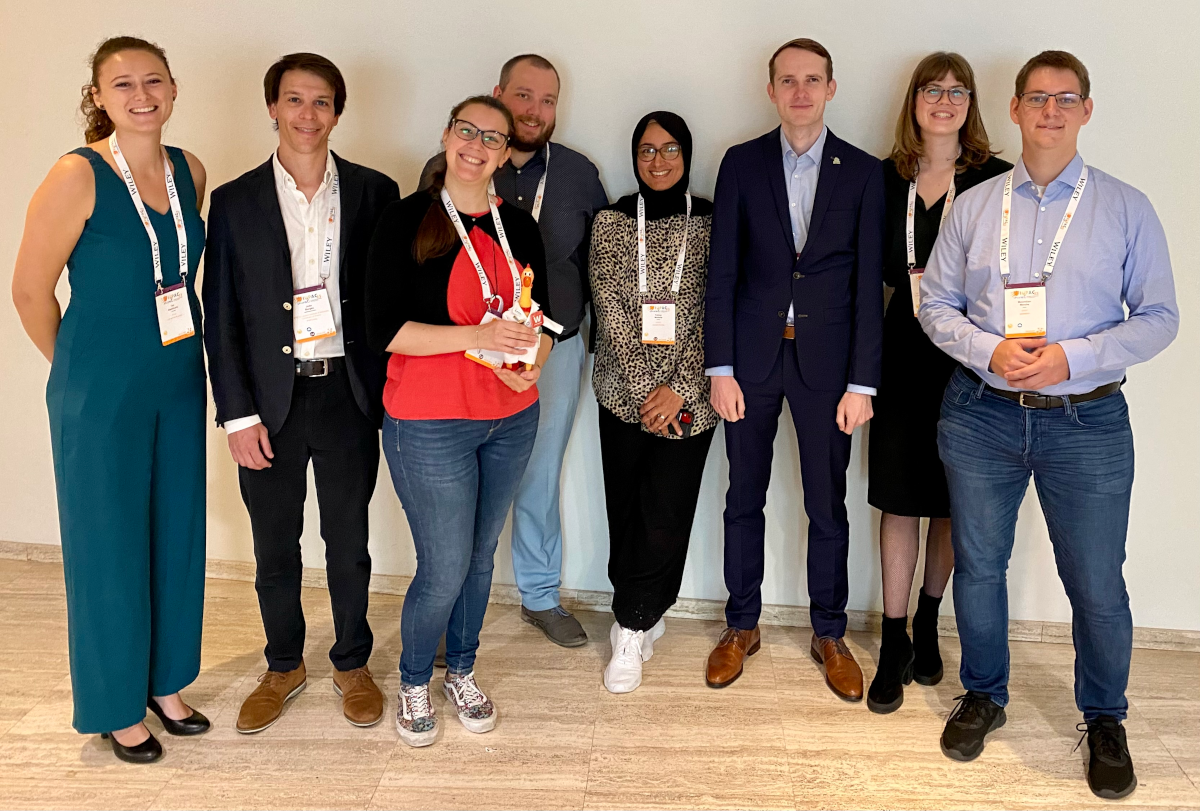
Figure 1. Young Program Theme Committee (from left to right): Tes Apeldoorn (KNCV member), Dr. João Borges (Co-Chair IYCN), Dr. Claudia Bonfio (EYCN), Koen van den Helder (Co-Chair Jong KNCV), Dr. Fatima Mustafa (IYCN), Dr. Torsten John (IYCN), Eva J. Meeus (KNCV member), Dr. Maximilian Menche (Co-Chair EYCN). Member Patrick Fritz (EYCN) is not in the picture.
2. Highlights from the Young Program
2.1 Workshops Devoted to Academic Careers
Scientific Illustrations, Scientific Writing, and Publishing
With members of the organizing committee in different career stages in academia, we had a good overview of the needs of young chemists who strive to pursue an academic career. For example, workshops on scientific illustration and scientific writing and publishing were held to provide the practical tools needed to translate results and findings into well-written and illustrated publications.
“Well-designed scientific figures improve the perception of your intellectual and scientific competence and, therefore, your impact,” said Thomas Hartman, who gave the workshop on scientific illustration (see Fig. 2, top left). For the scientific writing and publishing workshop, we invited Francesca Novara from Chemistry Europe and Wiley-VCH. Speaking in her role as an Editor, she provided tips, advice, and best practices on how to get one’s paper reviewed and published and how to best navigate the peer-review process.
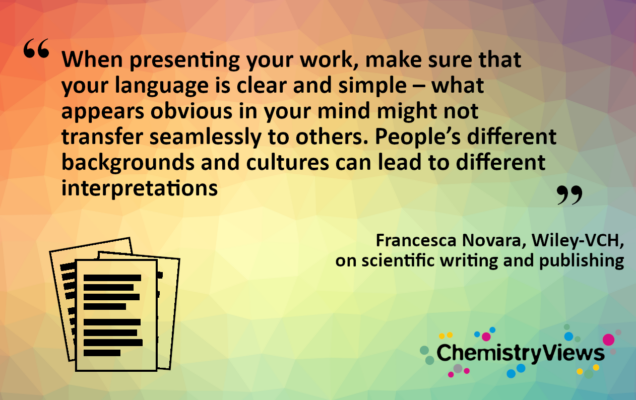
Funding
The career progression of young chemists in academia goes hand‑in‑hand with applications to funding schemes. Hence, we organized some workshops to cover this topic. Since the conference was held in The Netherlands, we invited the Dutch Research Council (NWO) and EU Grant Advisor Claudia Nicolaije from UMC Utrecht, The Netherlands. Timothy Noël, Full Professor at the University of Amsterdam, The Netherlands, gave an inspiring talk on how common failure is when it comes to grant writing and why one should never give up (see Fig. 2, top row center)!
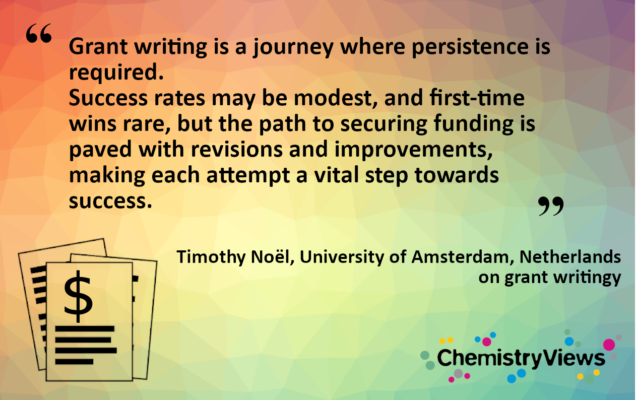
Science Communication
We also organized two interactive workshops on science communication and outreach, one of them was jointly organized with the American Chemical Society (ACS) via their ACS on Campus team. The invited speakers shared tips and practical advice for young chemists to improve their communication skills and effectively communicate their scientific discoveries in an engaging way to be better perceived by different audiences (see Fig. 2, top right).
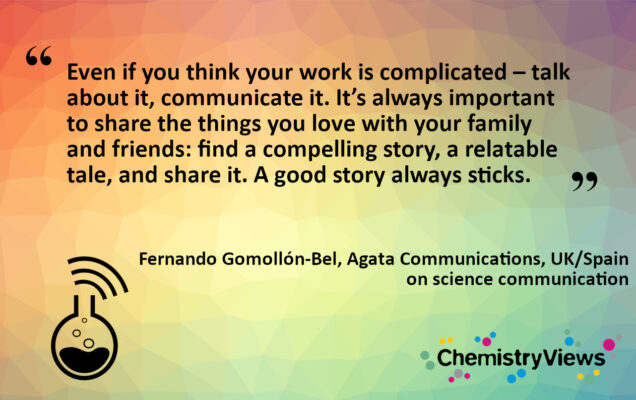
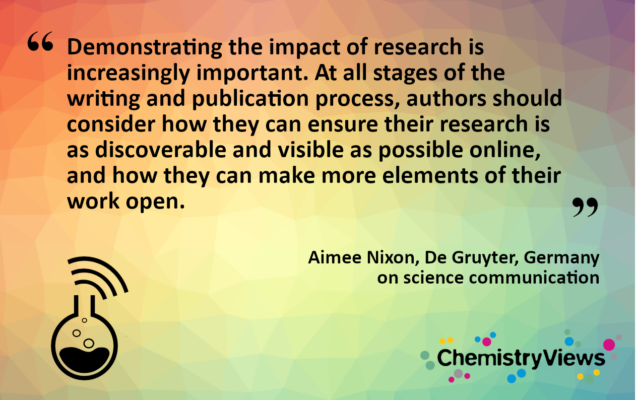
Mentoring
Supervision and mentoring are also important topics concerning the personal, professional, and career development of young scientists. We adopted a dynamic panel discussion gathering experienced academics from Europe and beyond (see Fig. 2, bottom left). The workshop proved to be a great hit, and it was described as very meaningful by both the participants and panelists, who stated that they had learned something from each other, including diverse ways to supervise and support students in pursuing their career goals.
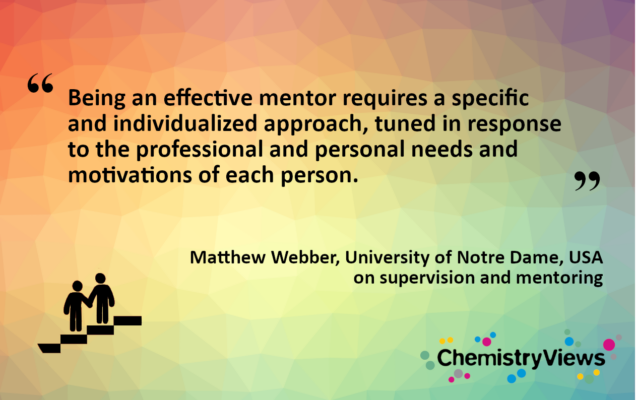
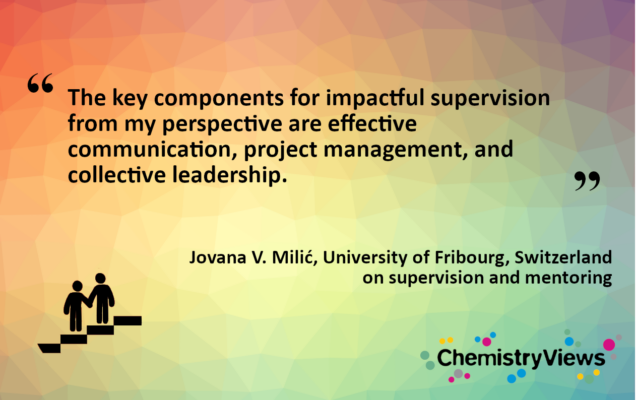
Safety
Managing chemical safety and security are topics of paramount importance that should be duly implemented in the chemistry curricula across universities and institutes worldwide, and carefully considered by early-career chemists. For that, young chemists need proper training to become fully aware of the risks behind the use of chemicals and adopt a defensive approach and suitable protective measures.
Having this in mind, we hosted a safety training session in close collaboration with the International Union of Pure and Applied Chemistry (IUPAC) Committee on Chemistry and Industry (COCI). They raised awareness about the importance of promoting a culture of chemical safety and security and identified gaps and opportunities in the sound management of chemical safety by young chemists.
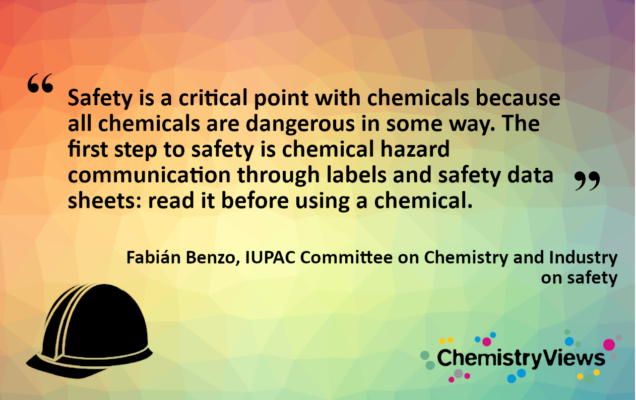
CV Writing
Finally, a workshop on CV writing for academic careers took place (see Fig. 2, bottom row center), being supported by the career and professional development advisor Robert Bowles from the Royal Society of Chemistry (RSC), as well as by the scientific program officer Joanna Kowalska from the German Research Foundation (DFG). This session aimed at providing tips and advice to the early-career chemists on how to structure and adapt their CVs for academic careers, gathering a lot of interest among the enthusiastic participants. In addition, one-to-one CV checks (see Fig. 2, bottom right) were kindly offered by the RSC.
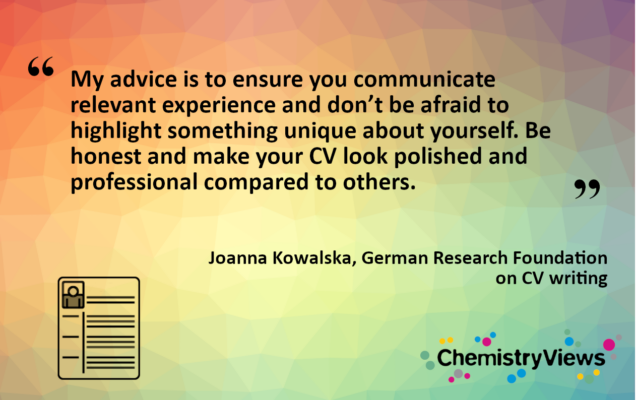
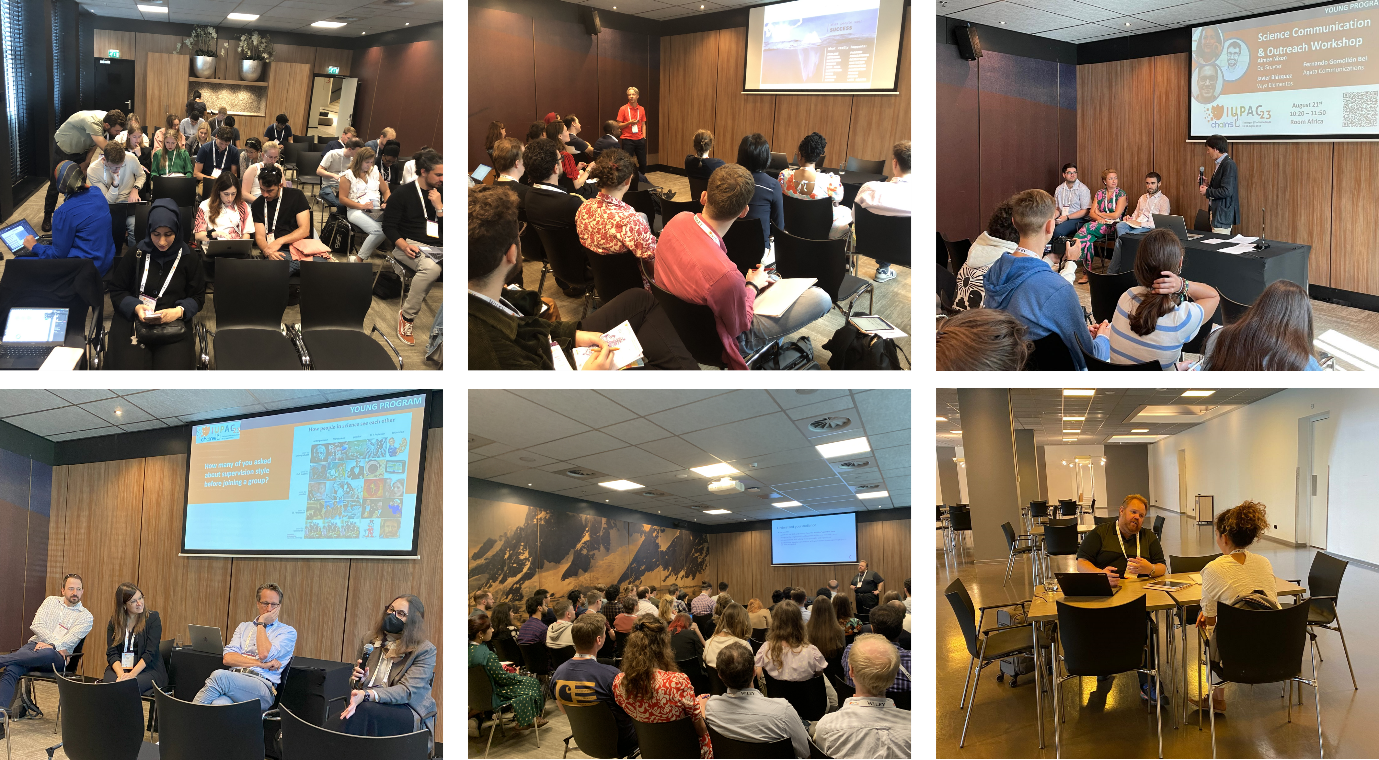
Figure 2. Scientific illustration workshop given by Dr. Thomas Hartman, Thomas Hartman Illustrates Science, the Netherlands (top left). Grant writing workshop with a talk by Prof. Timothy Noël, University of Amsterdam, the Netherlands (top row center). Science communication and outreach workshop with Aimee Nixon, De Gruyter, Dr. Fernando Gomollón-Bel, Agata Communications, and Javier Blázquez-Martínez, Vaya Elementos, moderated by Dr. João Borges, University of Aveiro, Portugal (top right). Supervision and mentoring panel with Prof. Jovana V. Milić, University of Fribourg, Switzerland, Prof. Roxanne Kieltyka, University of Leiden, The Netherlands, Prof. Matthew Webber, University of Notre Dame, USA, and Prof. Joost Reek, University of Amsterdam, The Netherlands, moderated by Dr. Claudia Bonfio, University of Strasbourg, France (bottom left). CV writing for academic/industrial careers with a talk by Robert Bowles, the Royal Society of Chemistry, UK (bottom row center), and one-to-one CV checks (bottom right).
2.2 Workshops Devoted to Industrial Careers
In addition to the workshop on CV writing for academic careers, we hosted a session on CV writing for industrial careers aiming to fulfill the needs of early-career researchers pursuing this path. The industrial-oriented program was complemented by an interactive workshop that dealt with safe and sustainable design and challenged the attendees to discuss various aspects playing into product and process decisions towards a sustainable future.
The importance of safety in large industrial processes was also covered by a workshop hosted in collaboration with the Dutch Safety Board, in which Linda Hoekstra challenged participants to become “detectives” going through a real-world incident (see Fig. 3, top left). This case study not only enabled early-career chemists to understand how such investigations are carried out, but also which drastic consequences can follow from small safety concerns.
The focus of two “Roads to Success” sessions was to emphasize the diverse career paths that can be pursued with a chemistry background and to inspire and broaden the career perspectives of early-career chemists (see Fig. 3, top right). These sessions gave a diverse set of recent graduates and senior executives, with different backgrounds and company sizes, an opportunity to present their careers, their current roles, and some lessons learned on the way.
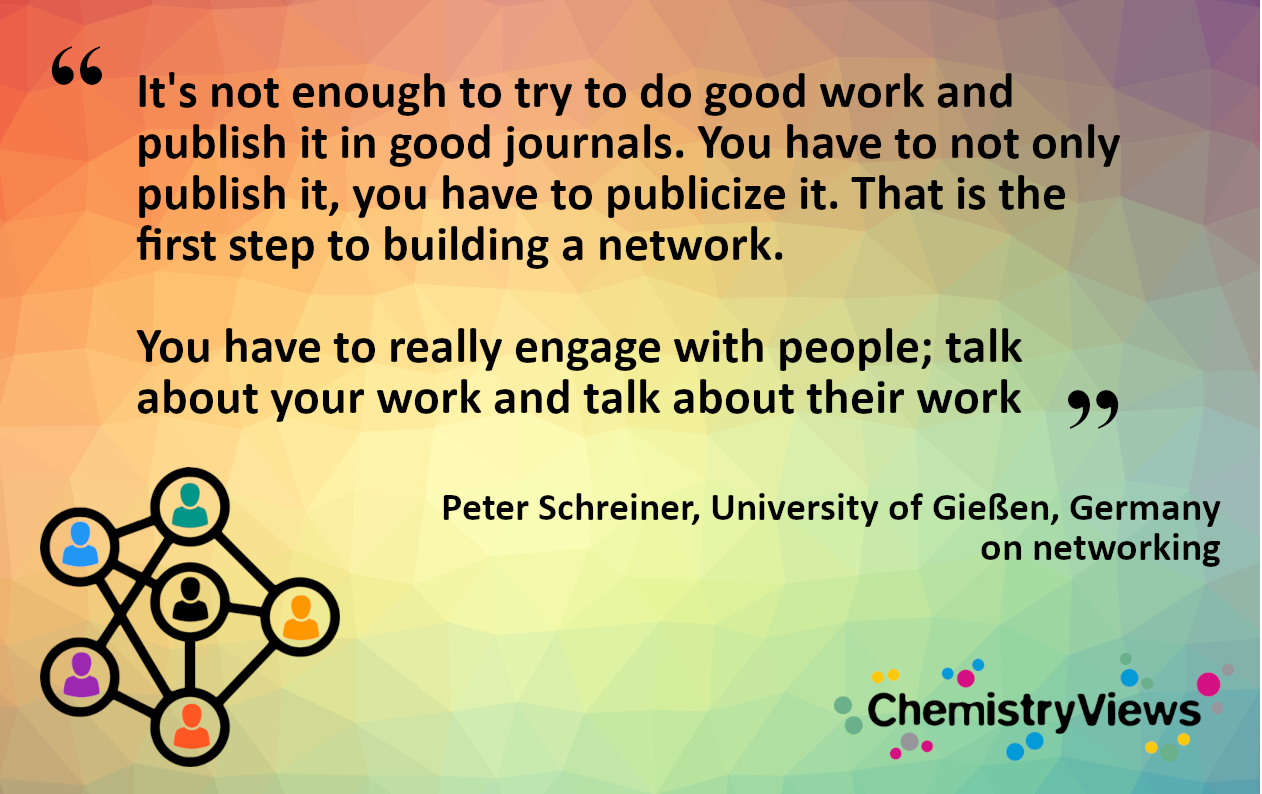
Additionally, we hosted a session on “How and Why You Should Network”. This session aimed at highlighting the vital importance of networking as one of the most relevant pillars and actions in enabling the career progression and the professional development of early-career chemists, in addition to their personal development (see Fig. 3, bottom left and right). Jessica Vermeer (Royal Netherlands Chemical Society), Lene Hviid (Shell), and Peter Schreiner (German Chemical Society, GDCh) provided tips and advice to participants on how to introduce themselves, communicate their research and activities, and make use of networking opportunities, being a perfect introduction to the networking sessions that followed.
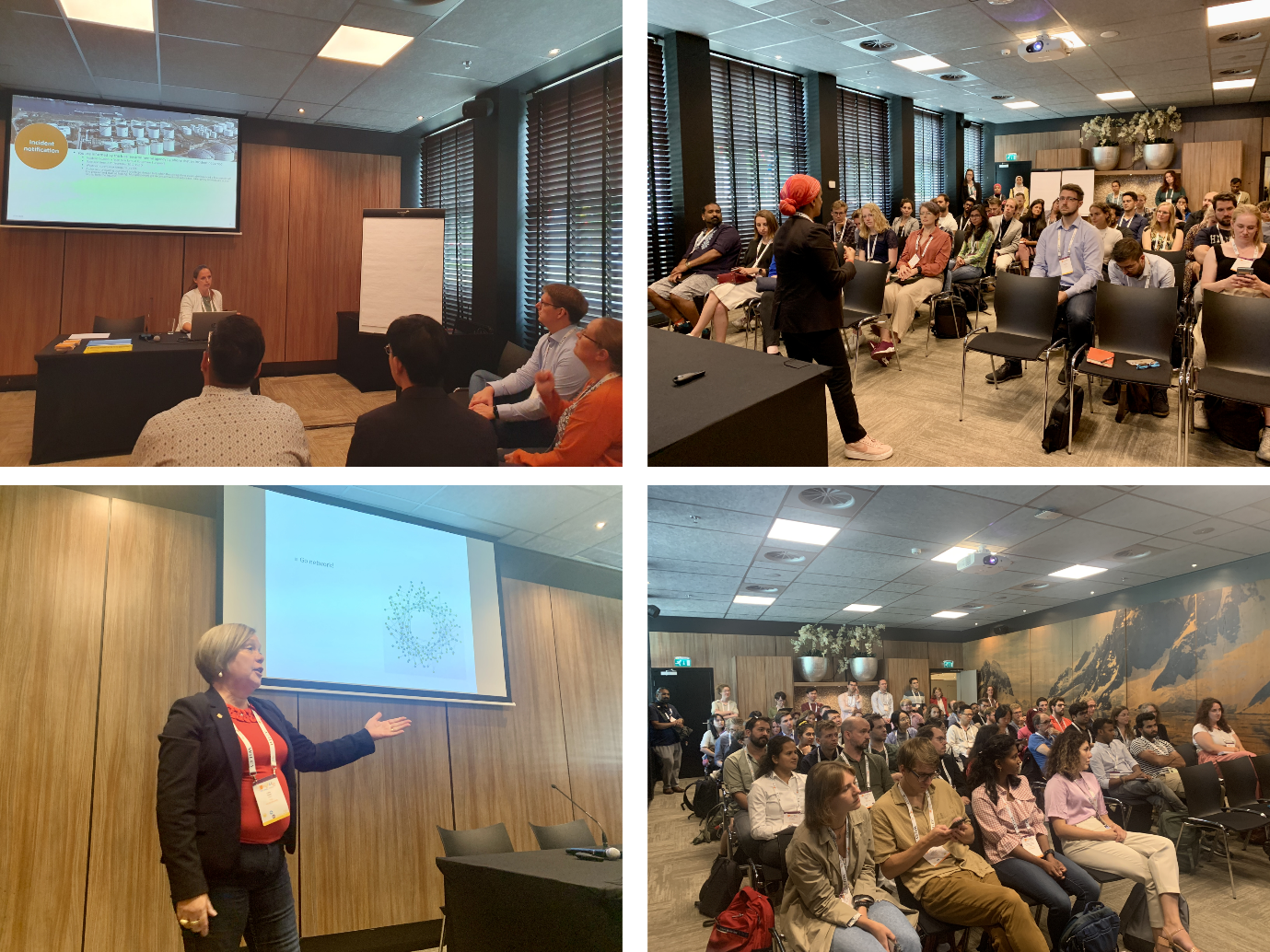
Figure 3. Workshop on “how to learn from incidents” headed by Linda Hoekstra, Dutch Safety Board, The Netherlands (top left). “Roads to success” session with a talk by Dr. Rehana Sidat, GSK (top right). “How and why you should network” session with a talk by Dr. Lene Hviid, Shell (bottom left), and the audience attending it (bottom right).
2.3 General Workshops
In addition to the workshops devoted to academic and industrial careers, we organized a series of more general workshops on topics that are essential to advance the professional development of early-career chemists irrespective of their future career journeys. Those included an interactive and inspirational session on science and technology leadership skills (see Fig. 4, top left) headed by Maria Sovago (Stralia). In this session, the participants exchanged ideas and learned how to create and strengthen relationships, build commitment and strong teams, and adapt their behavior in an ever-changing world.
The basics of research data management applied to chemistry were the focus of the session headed by Sonja Herres-Pawlis, Co-Speaker of the NFDI4Chem and Professor at RWTH Aachen University, Germany, in which the participants learned about its importance to ensure that data is FAIR – Findable, Accessible, Interoperable, Reusable (see Fig. 4, top right). The early-career chemists also learned about the FAIR principles, repositories, electronic lab notebooks, data management plans, open data standards, and how data is enabling research across the chemical sciences.
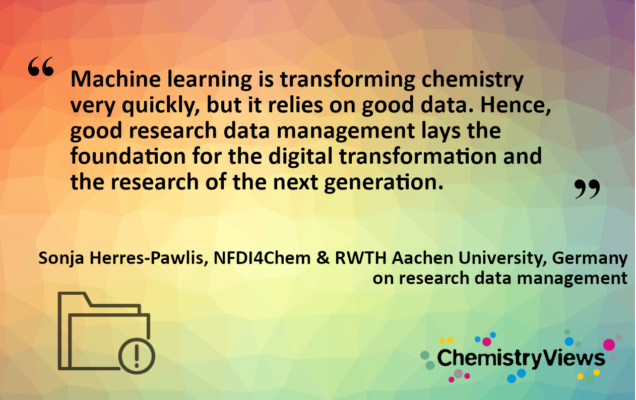
The “mental health basics and imposter phenomenon in academia” workshop by Anya Vvedenskaya (Dragonfly Mental Health) was another session that was well received and gathered a lot of interest among the enthusiastic participants (see Fig. 4, bottom left). The participants were informed about the symptoms and the prevalence of mental illnesses and imposter syndrome in academia, the underlying science, and strategies to overcome those serious illnesses in our own lives.
Last, but not least, we hosted a session on diversity, equity, and inclusion (DEI) in the chemical sciences, providing an overview of the different aspects of DEI and highlighting some strategies and actions to create an inclusive, fair research culture (see Fig. 4, bottom right). Soraya Groenevelt (Shell), Mark Cesa (IUPAC), and Angela Wilson (ACS) covered aspects that are not often discussed, such as disability and gender identity.
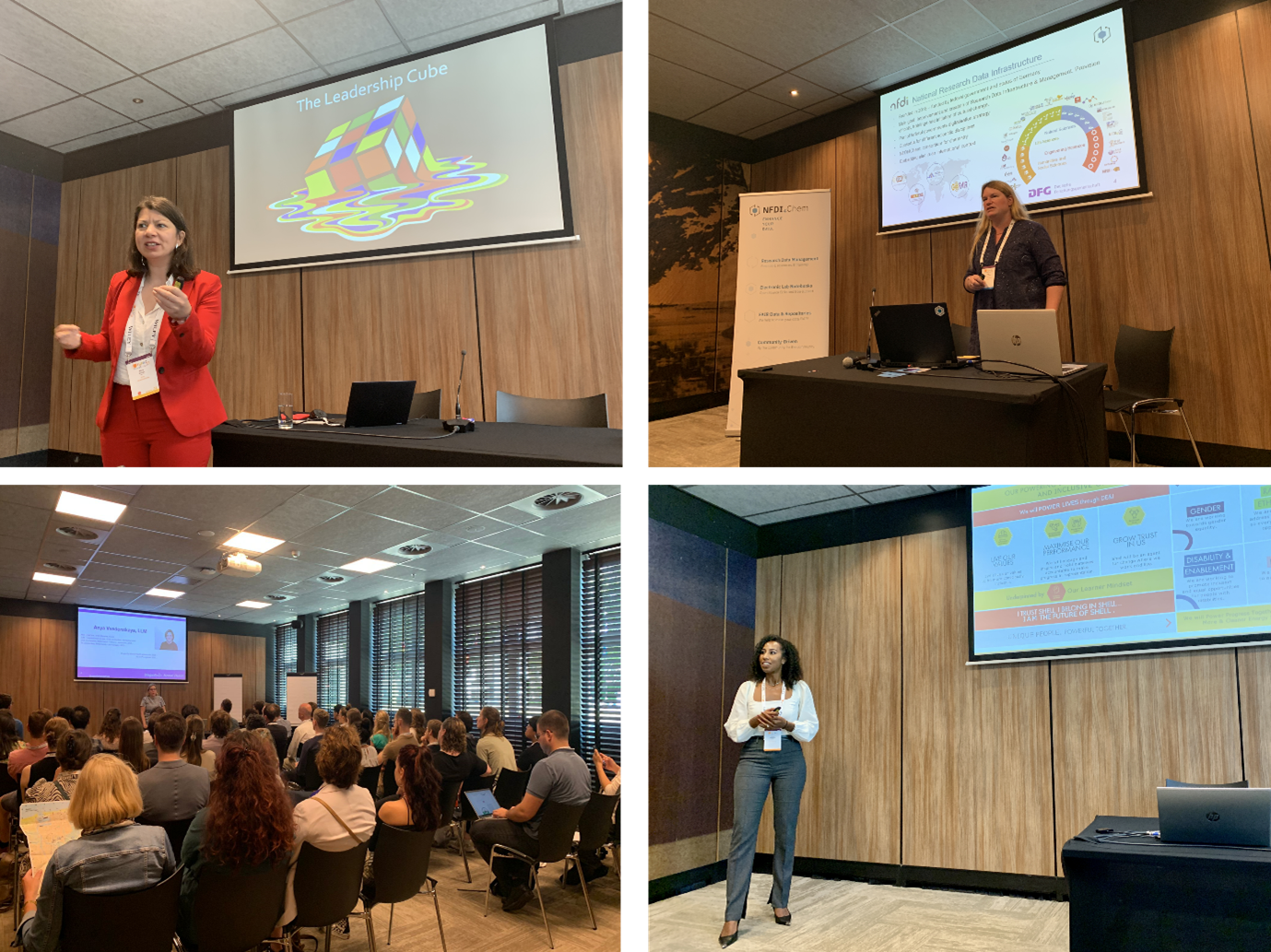
Figure 4. Leadership session with a talk by Dr. Maria Sovago, Stralia (top left). Data management in chemistry session with a talk by Prof. Sonja Herres-Pawlis, NFDI4Chem (top right). Mental health session headed by Anya Vvedenskaya, Dragonfly Mental Health (bottom left). DEI session with a talk by Soraya Groenevelt, Shell (bottom right).
2.4 Meet & Greet Sessions
We hosted informal meet-and-greet sessions focusing on the people beyond their role as scientists. We invited all plenary speakers attending IUPAC|CHAINS 2023, as well as other distinguished guests to 90-minute sessions aiming to know more about their lives. We asked them questions such as “Why did you go into chemistry?”, “Why did you make this particular choice?”, “What are your hobbies?”, and “What do you think lies ahead in the future?”. In these interactive sessions, moderated by the Young Program Theme Committee members, we got several unexpected answers.
For example, in the meet-and-greet with Ben Feringa, Professor at the University of Groningen, The Netherlands, we spoke about his life as a student (see Fig. 5, left). He told us that he occasionally went out to meet friends and would go directly to the lab afterward. Who would have thought? He also showed us that it is perfectly possible to become a distinguished chemist with a start outside of academia.
Molly Stevens, Professor at Imperial College London, UK (see Fig. 5, center), and Chad Mirkin, Professor at Northwestern University, USA, covered topics such as how to run a big lab, the importance of fundamental but also translational research in accelerating the translation of the lab research findings into real-world applications for the benefit of society, the role of mentors and the lessons learned from their mentors in shaping their careers, and entrepreneurship.
During the meet-and-greet with Javier García Martínez, Professor at the University of Alicante, Spain, and IUPAC President for the biennium 2022–2023 (see Fig. 5, top right), we learned about his amazing journey at IUPAC, from being involved at his early-career stage to leading this worldwide organization with passion and pride. García Martínez encouraged early-career chemists to navigate the IUPAC website to find projects fitting their interests and to contact the project leaders to become involved and actively contribute to a sustainable future through chemistry. He also recognized the key role and invaluable contributions of the early-career chemists to IUPAC, to the chemistry community at large, and to society, and sees a bright future in their hands. He emphasized how proud and excited he was about the possible incorporation of the IYCN into IUPAC as a Committee, which was enthusiastically supported and approved a few days later at the IUPAC Council Meeting, taking place during the IUPAC|CHAINS 2023.
Attendees were encouraged to ask questions as well, and so they did. For example, during the session with Bartosz Grzybowski, Professor at the Ulsan National Institute of Science and Technology, South Korea, an attendee asked if scientists should start a company to finance their research. Grzybowski answered that it is not necessary, but could help getting scientific freedom, as he did himself.
Although most of the meet-and-greets had each individual plenary speaker as a guest, we also hosted a special panel on “Women in Chemistry” featuring some of the plenary speakers but also other distinguished guests (see Fig. 5, bottom right). We enjoyed a fruitful conversation with the panelists Charlotte Williams, Professor at the University of Oxford, UK, Jennifer Thomson, Professor at the University of Cape Town, South Africa, and Angela Wilson, Professor at Michigan State University, USA on topics such as their excitement for chemistry, the importance of female role models and how they experience being a role model themselves, and how to improve work-life balance.
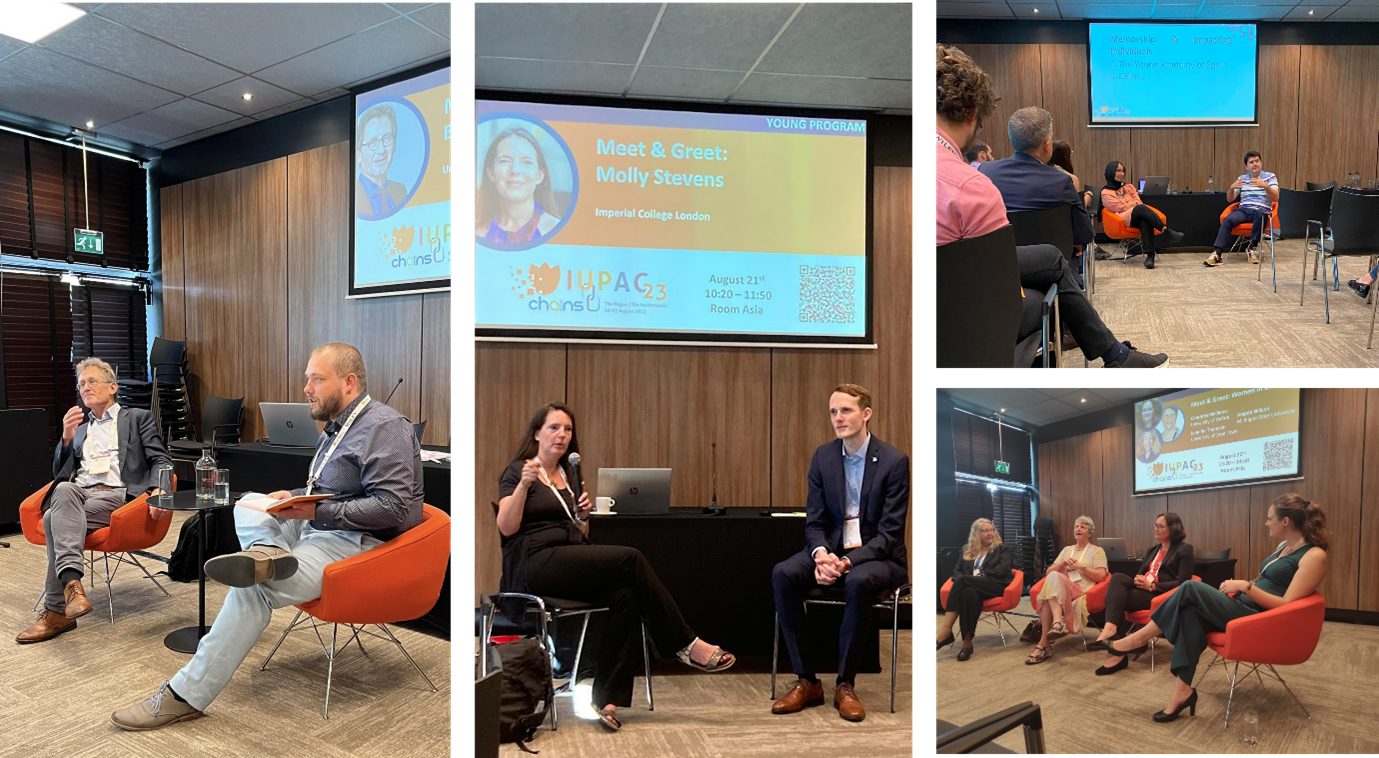
Figure 5. Meet-and-greet sessions with: Prof. Ben Feringa, University of Groningen, The Netherlands, moderated by Koen van den Helder, The Netherlands (left). Prof. Molly Stevens, Imperial College London, UK, moderated by Dr. Torsten John, Max Planck Institute for Polymer Research, Mainz, Germany (center). Prof. Javier García Martínez, University of Alicante, Spain, and IUPAC President 2022-2023, moderated by Dr. Fatima Mustafa, The University of Texas at San Antonio, USA (top right). Prof. Angela Wilson, Michigan State University, USA, Prof. Jennifer Thomson, The University of Cape Town, South Africa, and Prof. Charlotte Williams, Oxford University, UK, moderated by Tes Apeldoorn, Neste, The Netherlands (bottom right).
2.5 Games and Networking Opportunities
The greatest benefit of an in-person congress is the ease of meeting old and new people and friends, making connections, and networking. Our program facilitated this via several activities that stimulated networking opportunities, such as a PowerPoint karaoke, an Element Game, the Photochimica exhibition, and the IUPAC-Young Scientists’ networking event.
The PowerPoint karaoke was an informal session in which attendees could take the stage and start presenting an unknown set of slides, prepared by our committee, in front of an unknown audience (see Fig. 6, left). This funny activity aimed at improving their improvisation and communication skills, as well as getting to know other attendees in an informal and relaxed environment.
In the Element Game, atom cards could be collected around the conference foyer and used as business cards to be exchanged with other attendees during the congress. Each attendee aimed at collecting several cards (i.e., several atoms) to make a specific molecule.
The photo exhibition showcased photographs from the EYCN’s Photochimica photo competition (see Fig. 6, top right). Under the topic “Chemistry in Everyday Life”, contestants were asked to submit their creative takes on showing how chemistry is all around us.
In addition, we organized other activities, such as a networking session jointly organized with IUPAC. In this session, early-career chemists could circulate among several tables, each one gathering members from the different Divisions and Standing Committees of IUPAC, to meet them, become acquainted with their activities, and build professional collaborative networks. In addition, the IYCN, the EYCN, and the Jong KNCV jointly organized a networking session aiming to introduce each young chemists’ network to the attendees and answer any questions.
Several posters were available throughout the congress pertaining to the IUPAC Divisions and Standing Committees, as well as young chemists’ networks (see Fig. 6, bottom right). Lastly, there was a chemistry escape game entitled “ChemEscape” by the Young Chemists’ Network (JCF) of the German Chemical Society (GDCh). This game, which can be supervised by a teacher, is based on chemistry experiments and aims to inspire students to study Science, Technology, Engineering, and Mathematics (STEM) subjects, in particular, chemistry.
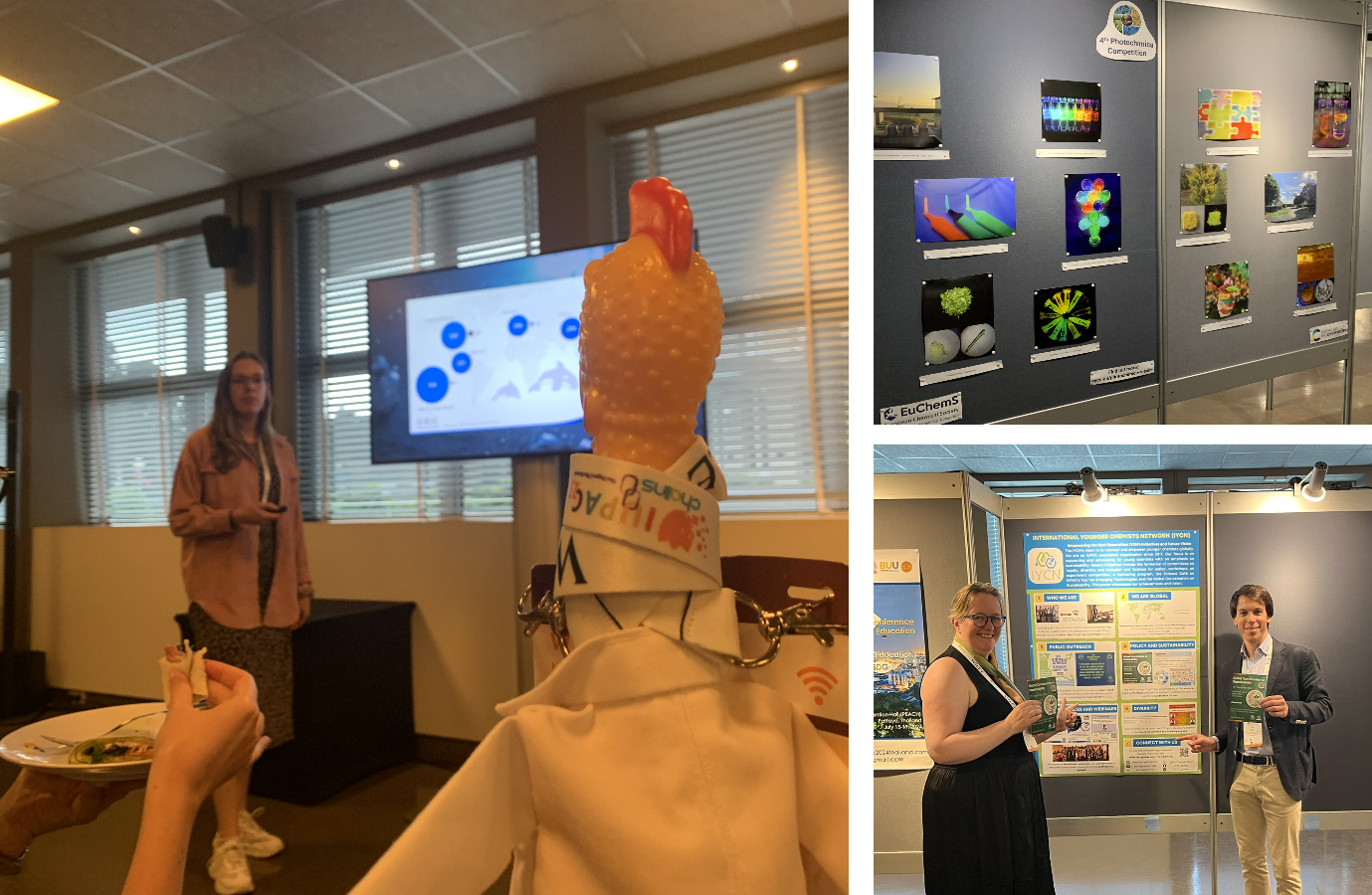
Figure 6. PowerPoint karaoke with a well-known and very attentive guest: Prof. ChemChicken (left). Photographs from the EYCN’s Photochimica photo competition (top right). Young chemists’ networking session showcasing a poster by the IYCN and flyers about the IYCN/IUPAC joint project “Global Conversation on Sustainability (GCS)” held by Prof. Francesca Kerton, Professor at Memorial University, Canada, and Chair of the CHEMRAWN Committee at IUPAC, and Dr. João Borges, University of Aveiro, Portugal, and Co-Chair of the GCS (bottom right).
3 An Invaluable Experience and Opportunity
Planning and organizing the Young Program at IUPAC|CHAINS 2023 was an invaluable experience and opportunity for the Young Program Theme Committee members. Over the last two years, we had the chance to interact and engage in fruitful exchanges and discussions with each other, and tirelessly worked together in planning and organizing an inspiring and stimulating program to connect, empower, and advance the professional development of early career chemists.
During this time, it was fundamental to be open-minded, support each other, and engage in a fruitful dialogue moving forward. Together, we defined the different sessions and activities and split efforts, by working in smaller teams, using the experience and contacts made previously by each team member for the different duties and activities of the Young Program. This enabled more focused meetings among each team before meeting with everyone and taking decisions concerning the speakers to be invited, the format, and the days, time slots, and chairs of the different sessions. All of this enabled a smooth preparation and planning of the program.
While on-site, the Young Program Theme Committee members truly enjoyed greeting and meeting each other in-person after numerous online meetings, as well as meeting the invited speakers and attendees and taking part in stimulating discussions. The different workshops, meet-and-greet sessions, networking activities, and games were very well received by the early-career chemists attending the congress.
We are thankful to all attendees who engaged in the Young Program at IUPAC|CHAINS 2023 and to all the invited speakers, panelists, and organizations that accepted our invitation to share their experience and expertise, network, and enlighten the community of early-career chemists. Of course, a huge shout-out should be given to all the Young Program Theme Committee members for their dedication, commitment, and resilience in building up an inspiring program for the benefit of early-career chemists.
4 Get Actively Involved Yourself
We take this opportunity to encourage early-career chemists worldwide to take part and be actively involved in the organization of similar programs and conferences at national or international levels for the benefit of young chemists. Although devoting some of your time towards empowering colleagues might sound challenging while building up your career, you will learn, develop, and expand the portfolio of transferable skills that contribute to your personal and professional growth. You will learn how to teamwork and manage your time efficiently, build personal ties and professional contacts, discover new career opportunities and paths, be exposed to diverse cultural environments, make new friends, to name just a few benefits. Make sure to engage and surround yourself by committed, devoted, enthusiastic, and like-minded early-career chemists that aim to learn from each other and grow together.
We truly hope that this article can be a source of inspiration, and we look forward to meeting and attending conferences organized by early-career chemists for early-career chemists.
Of course, we always welcome new members to the IYCN, the EYCN and Jong KNCV. If you are interested, get in touch with the young chemists in your country or contact us at [email protected] (IYCN), [email protected] (EYCN), and [email protected] (Jong KNCV).
The Authors
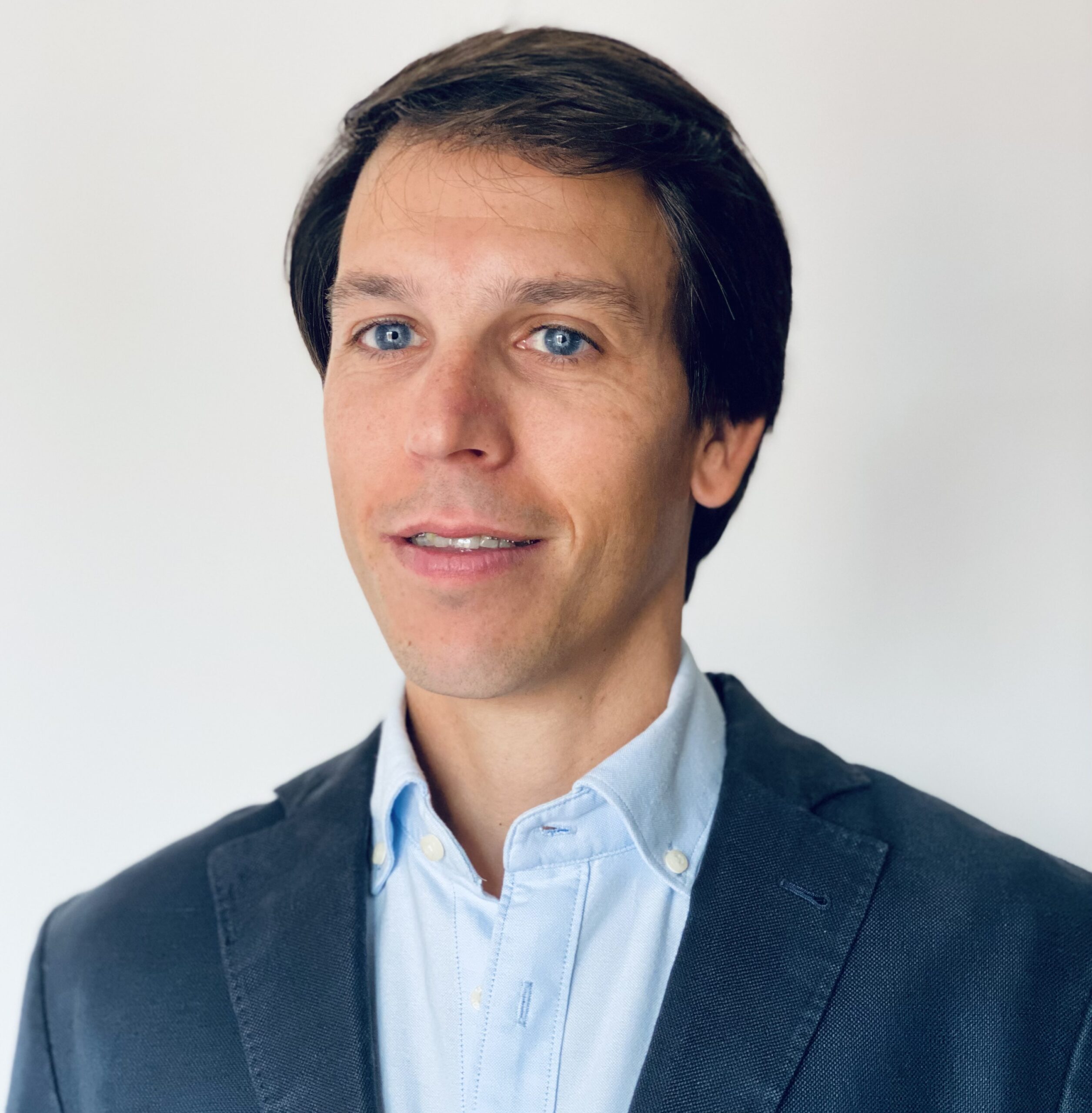 João Borges
João Borges.gif)
CICECO – Aveiro Institute of Materials, Department of Chemistry, University of Aveiro, Campus Universitário de Santiago, 3810-193 Aveiro, Portugal
E-mail: [email protected]
Dr. João Borges is a Senior Researcher at the Department of Chemistry and CICECO – Aveiro Institute of Materials at the University of Aveiro, Portugal. He holds a Ph.D. in Chemistry from the University of Porto. His research focuses on the molecular design, synthesis, and development of bioinstructive supramolecular multicomponent biomaterials by combining polysaccharides, peptides, and nucleic acids to interface with living systems. He is the Past Chair of the International Younger Chemists Network (IYCN, 2022–2023), Co-Chair of the IYCN/IUPAC joint project “Global Conversation on Sustainability” (GCS), and an Affiliate Member of IUPAC.
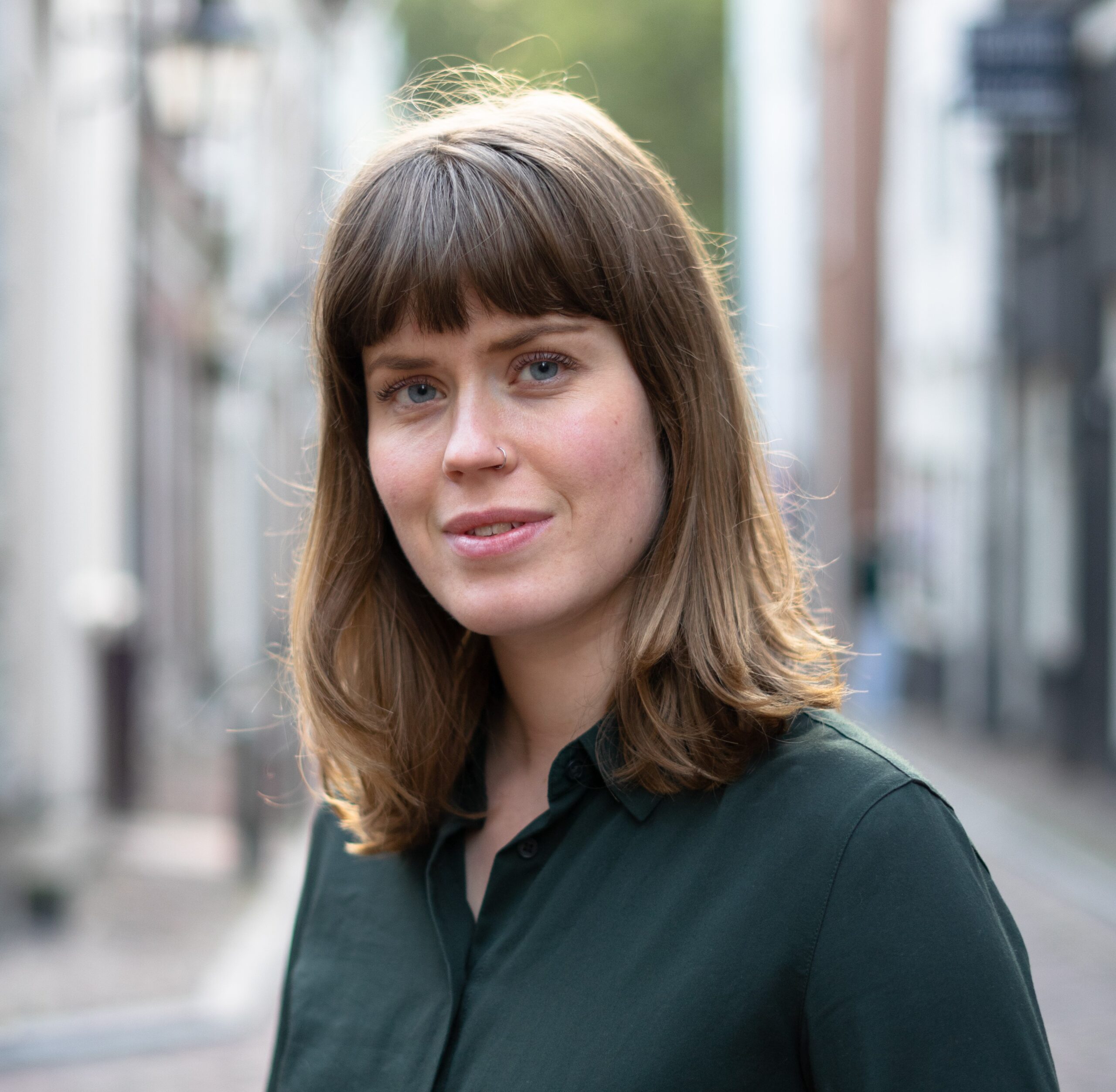 Eva J. Meeus
Eva J. Meeus.gif)
Van’t Hoff Institute for Molecular Sciences, University of Amsterdam, Science Park 904, Amsterdam 1098XH, The Netherlands
Eva J. Meeus is a Ph.D. candidate working on catalysis in aqueous and biologically relevant media under the supervision of Prof. B. de Bruin and Prof. J. N. H. Reek (University of Amsterdam, The Netherlands). She visited the University of Basel (Switzerland) to work on artificial metalloenzymes with Prof. T. R. Ward. After defending her thesis in January 2024, she will return to Switzerland to work with Prof. B. Morandi (ETH Zürich). Throughout her studies and Ph.D. work, she has always been an active member of the KNCV.
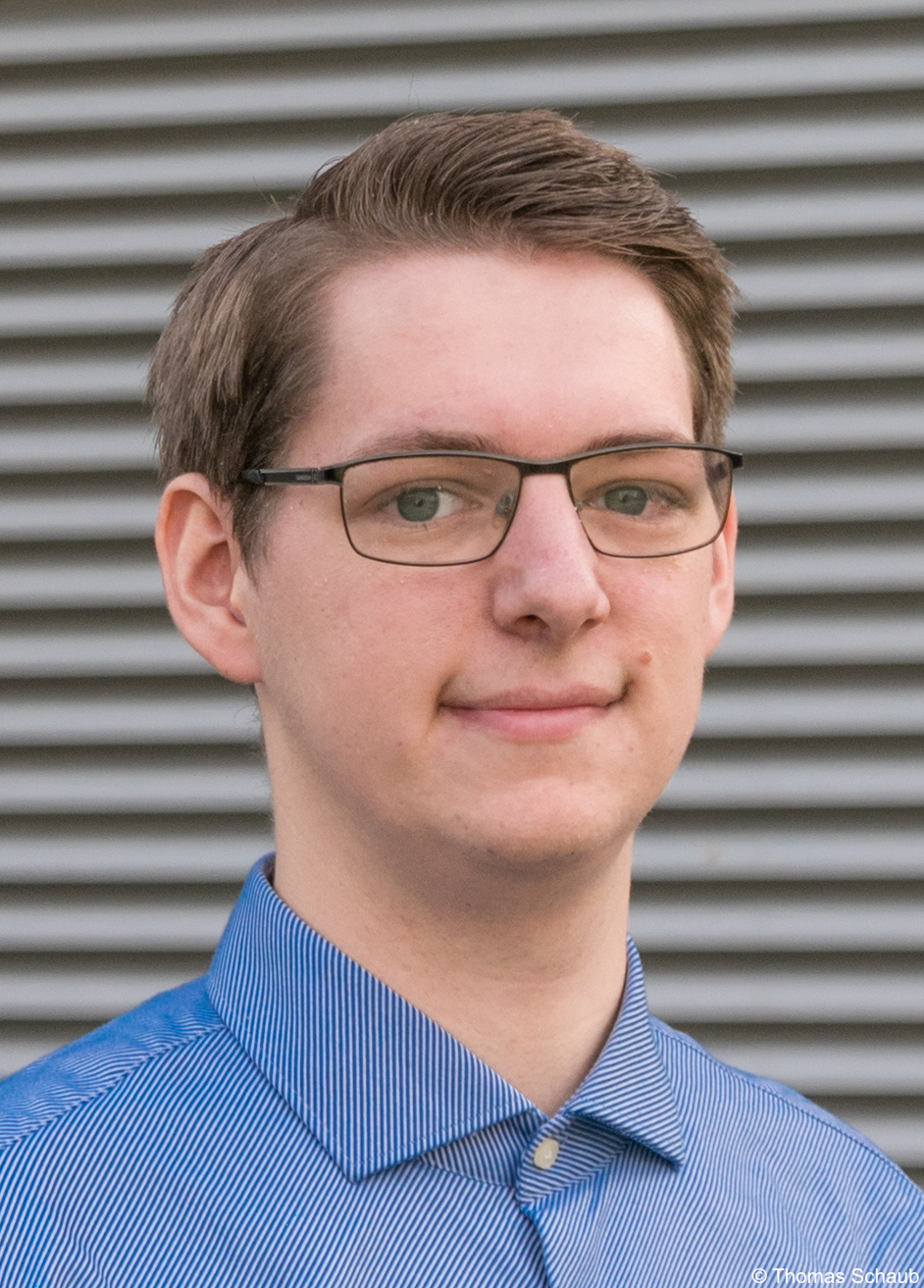
Maximilian Menche.gif)
BASF, Carl-Bosch-Strasse 38, 67056 Ludwigshafen am Rhein, Germany
Dr. Maximilian Menche studied chemistry at Goethe University Frankfurt am Main, Germany, and obtained his Ph.D. from Heidelberg University, Germany, working in the Catalysis Research Laboratory (CaRLa). Subsequently, he joined BASF as a scientist for quantum chemistry. He is the Past Chair and Advisor of the European Young Chemists’ Network (EYCN).
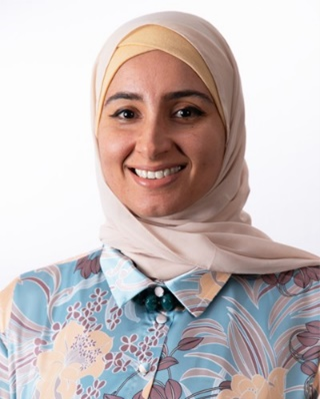 Fatima Mustafa
Fatima Mustafa.gif)
Department of Chemistry, The University of Texas at San Antonio, One UTSA Circle, San Antonio, TX 78249, USA
Dr. Fatima Mustafa is a lecturer at the Department of Chemistry, The University of Texas at San Antonio (UTSA), USA, and the WorldFAIR Chemistry project coordinator at IUPAC. She received a Ph.D. in Chemistry from Clarkson University, Potsdam, NY, USA. Fatima is passionate about supporting students and scientists in developing and coordinating programs. She was involved in multiple younger chemists’ organizations, including co-founding the Northern New York ACS Younger Chemists Committee and chairing the conference presence committee at the IYCN. She is currently a coordinator of the IUPAC Global Women’s Breakfast.
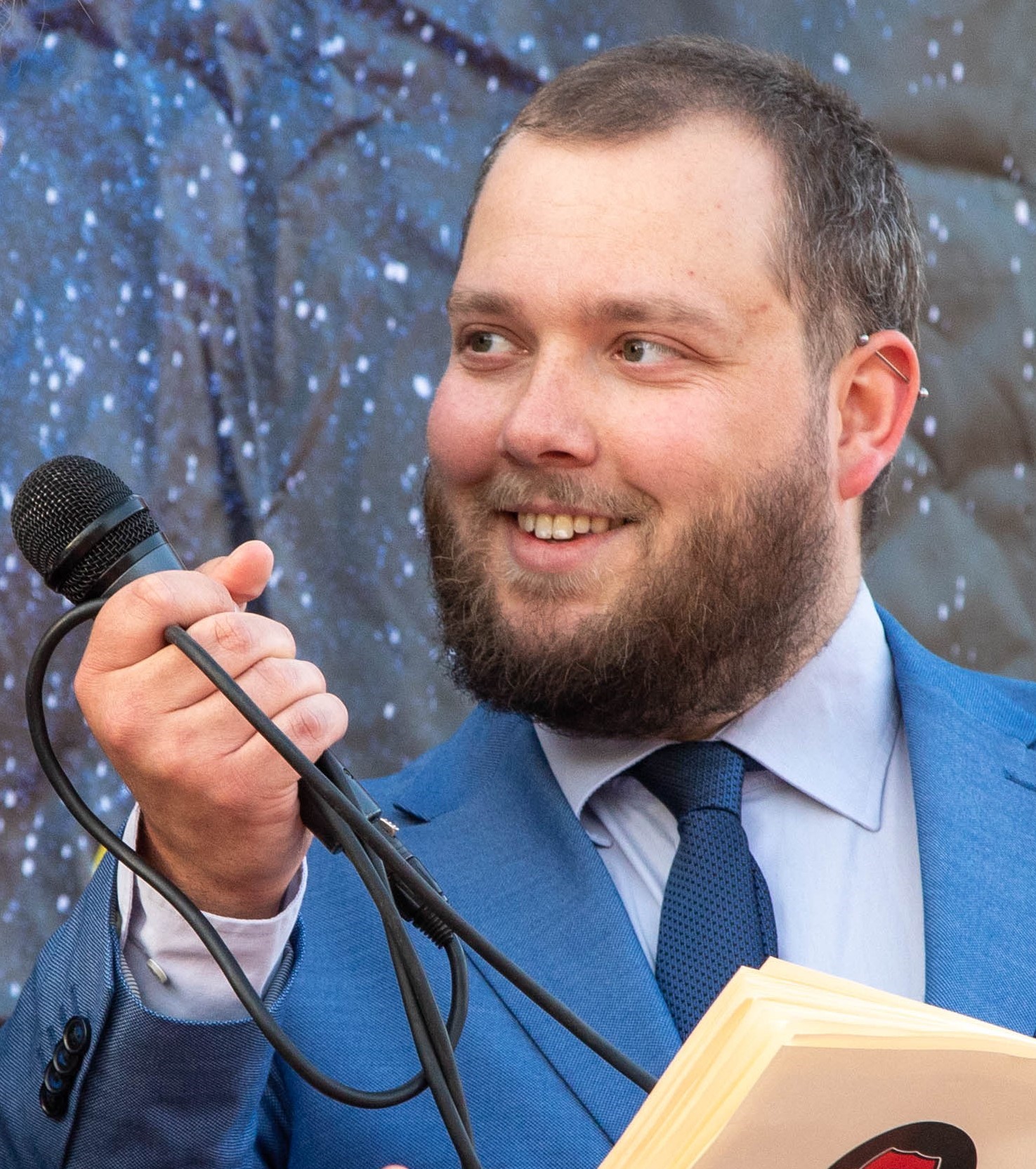 Koen van den Helder
Koen van den Helder
Freelancer
Koen van den Helder is freelance journalist, presenter, and voice actor. He completed his master’s in the field of physical chemistry with electives in philosophy and history of science. His current occupation focuses on communication and journalistic work inside and outside of the field of science. He is the Past Chair of the Young Royal Netherlands Chemical Society (Jong KNCV) and Past Delegate for the European Young Chemists’ Network (EYCN) and International Younger Chemists Network (IYCN).
Also of Interest

Research, superpowers, beyond the silicon age, AI, stopping misinformation, Cohen’s hammer, equity, networking, and more
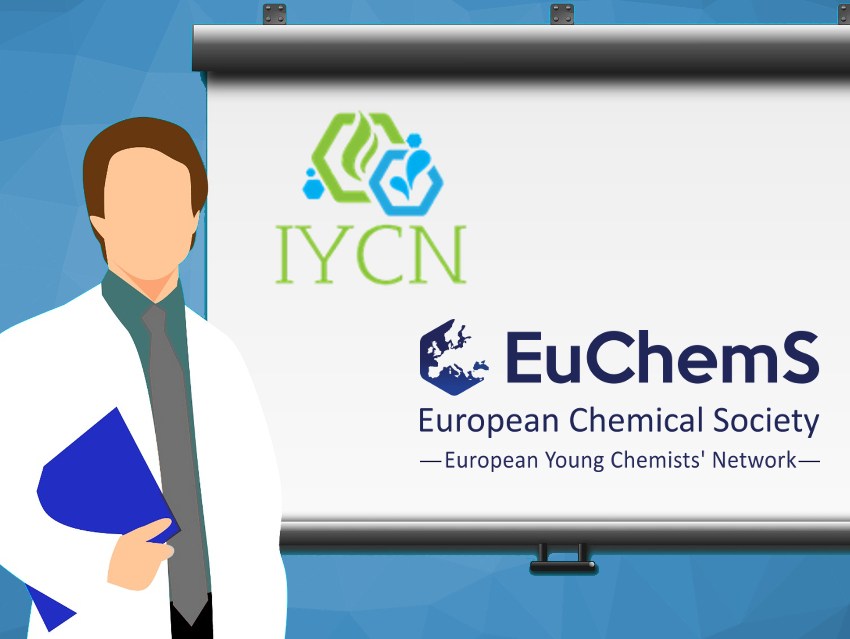
Serving the needs of chemists in the early stages of their career
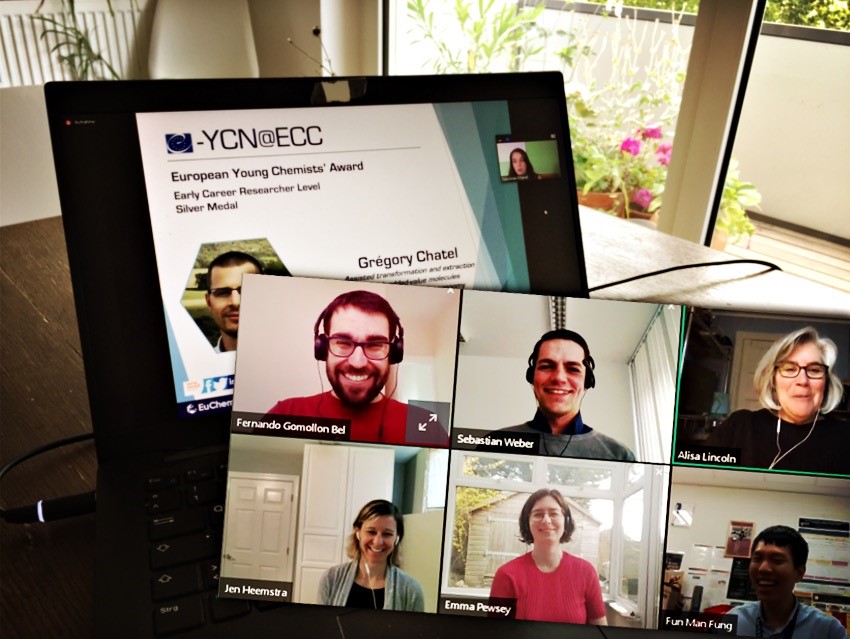
Experiences of younger chemists with virtual events
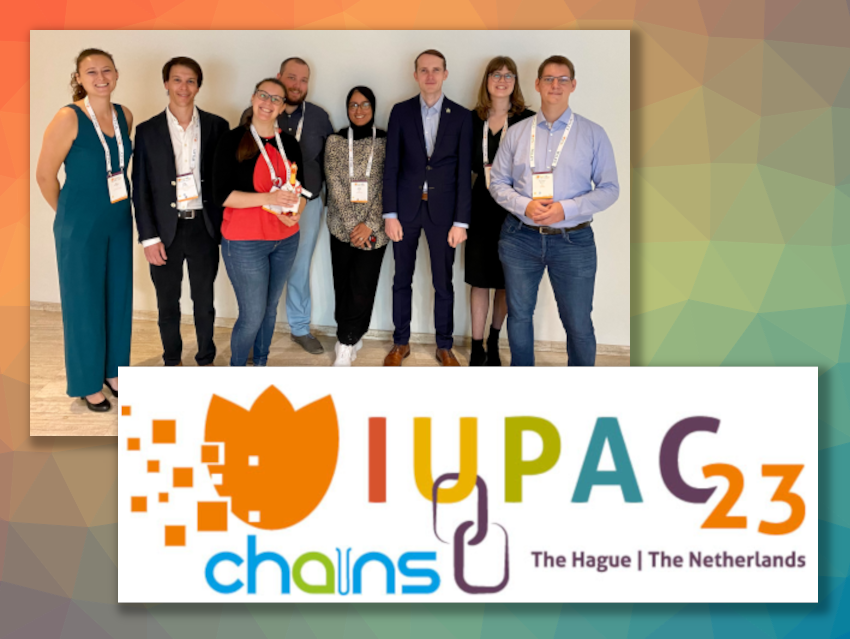



![9 Tips for a Successful PhD [Tip 9]](https://www.chemistryviews.org/wp-content/uploads/2025/04/202503_9-Tips-for-a-Successful-PhD_Tip9-125x94.png)